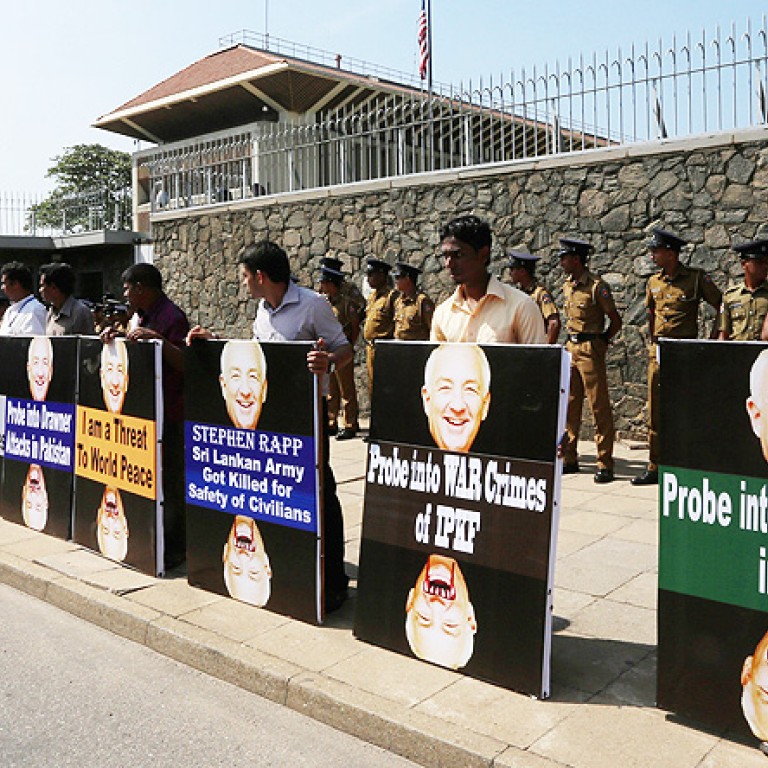
New inquiry raises pressure on Sri Lanka over war crimes
Sri Lanka’s army led an orgy of indiscriminate killing, says Public Interest Advocacy Centre report
Sri Lanka’s army led an orgy of indiscriminate killing at the climax of the island’s civil war, and has since tried to destroy evidence of its crimes, a new investigation published on Wednesday by foreign experts claimed.
A report released by the Public Interest Advocacy Centre (PIAC) in Australia claimed that soldiers committed the “vast majority” of crimes in a final government offensive against Tamil Tiger separatists in May 2009.
The probe comes ahead of a session at the UN Human Rights Council next month at which the US is due to move a third resolution pressing Sri Lanka to investigate the conduct of its troops or face further international censure.
Sri Lanka has resisted repeated calls for an international inquiry into allegations that up to 40,000 civilians were killed by government forces during the bloody finale to a conflict that dragged on for 37 years.
The allegations are that human remains from mass burial sites in the conflict zone were exhumed and were covertly destroyed
The PIAC’s International Crimes Evidence Project (ICEP) report entitled “Island of Impunity?” included material from independent international experts, UN staff members and new witness testimony.
“Certain alleged crimes committed during the final months of the war involved such flagrant and reckless disregard for the laws of war, which strongly suggests there was intent to commit those crimes,” the report said.
Early analysis suggested that the Sri Lankan government was exhuming and destroying evidence of mass civilian deaths, the report said.
The ICEP said it had obtained testimony from unidentified new witnesses that members of the Sri Lankan security forces had destroyed forensic evidence after the conflict.
“The allegations are that human remains from mass burial sites in the conflict zone were exhumed and were covertly destroyed,” the report said. “This highlights the urgent need for an internationally-mandated investigation.”
Sri Lanka’s military rejected the report as “old allegations” and denied there had been any digging up of graves to destroy evidence.
“There is nothing new in the report. It is the same old allegations already in the public domain,” Sri Lanka military spokesman Brigadier Ruwan Wanigasooriya said.
“There has only been one mass grave found (in the former war zone) and a judicial inquiry is underway,” he said.
He discounted charges of mass killings, torture and sexual violence, but said 17 soldiers had been prosecuted on charges of rape in the final stages of the fighting.
“We want to maintain a disciplined army and we take action when we are presented with evidence,” he said, adding that the latest report was an attempt to discredit Sri Lanka ahead of the UNHRC session in Geneva next month.
The report argued that an international investigation would be the “most effective mechanism for compiling a comprehensive list of persons for whom prosecutions is, or may be, warranted.”
The ICEP analysed the command structure of the security forces and the Tamil Tigers. The group said it had evidence against specific individuals but it did not name them.
It repeated previous charges that government forces executed surrendering senior Tamil Tiger political wing leaders as well as the youngest son of Tiger leader Velupillai Prabhakaran who was killed on May 18, 2009.
Sri Lanka lauds its record at defeating the Tamil Tigers, who mastered the use of suicide bombers and at their height controlled nearly a third of the country’s territory between 1990 and 1995.
President Mahinda Rajapakse was re-elected in 2010, largely on the back of his war record and support from the majority Sinhalese ethnic community.
The Tamil Tigers were fighting for a homeland for minority ethnic Tamils, who campaigners say face discrimination on the Buddhist-majority Indian Ocean island.
The report said it also had evidence that security forces were using rape and sexual violence on civilians after the war ended, a charge made by other rights groups and denied by Colombo.
